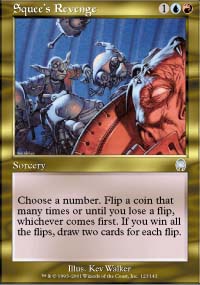Are you a Quiet Speculation member?
If not, now is a perfect time to join up! Our powerful tools, breaking-news analysis, and exclusive Discord channel will make sure you stay up to date and ahead of the curve.
Sometimes the game just screws you. You get very unlucky in an important match and feel completely out of control of your destiny. You have some right to complain, so long as you're not complaining to your opponent. Detracting from their win is just bad sportsmanship. We all get it, mulliganing a bunch and losing sucks. We don't need a refresher course in this when we're trying to be happy with our wins.
In particular, it's a big pet peeve of mine when people complain about things that aren't actually that unlikely. A standout in my mind is when people complain about not drawing a one-of in a match of limited. Often times these are the same people who whine when they lose to a bomb and now they're complaining that they didn't win even though they had a bomb in their deck...
This weekend an opponent of mine was talking about how much he had to mulligan on the day, and how it usually doesn't happen with his deck. I mused about how that sort of thing just happens statistically on a long enough timeline. He still seemed convinced that he had hit an unrealistic stroke of bad luck. This reminded me of an interesting example of how statistics work.
Let's say that we're flipping coins. The odds of not getting our desired result on a coin is 50%. The odds of not hitting our desired result three flips in a row is 12.5%. It's relatively unlikely to miss so consistently. However, let's say that we're looking for the odds of hitting the same result three times consecutively within a string of 10 flips. I'm no statistician, but here's how the odds of this occurrence were broken down for me:
Think about it this way: Every string of flips either ends in two matching flips or two non-matching flips.
Let a_n be the number of strings of n flips with no 3-peats that end in two matching flips
Let b_n be the number of strings of n flips with no 3-peats that end in non-two matching flips
We start with a_2 = 2 {HH and TT} and b_2 = 2 {HT and TH}
To find a_3 and b_3 we use the last values. from HH you can only go to HHT, but from HT you can go to HTT or HTH.
This leads to the following recurrence:
a_3 = b_2
b_3 = a_2 + b_2
or, more generically
a_n = b_(n-1)
b_n = a_(n-1) + b_(n-1)
If you want to do this math quickly, this is a 2x2 matrix with entries [0 1] and [1 1]
This gives us
a_3 = 2
b_3 = 4
(If you want to get fancy, this series is unique in that it will just give you consecutive fibonacci numbers*2)
and eventually gives us
a_10 = 68
b_10 = 110
So the number of 10-digit strings with no three-peat is 68+110 or 178.
There are 1024 possible strings so the odds are 178/1024, or 17.38%
If you isolate three flips your odds of such a string are a low 12.5%. If you look for the same result on three flips within a series of ten your odds of hitting such a string are a very likely 82.62%.
Obviously the odds of mulliganing with a given deck probably isn't 50%, but the point stands that unlikely things become very likely if you look at them in long strings as opposed to isolated incidents.
This is just how averages work. If your current experience isn't reflecting general probabilities, it's merely because anecdotes are terrible indicators of trends. Luck is probability taken personally, and the universe is completely indifferent to our complaints.
It's tough to take a bad beat in stride, but it's important to see the value in doing so. Not only does not understanding statistics just generally lead to feeling worse, but acting on these negative feelings can have a negative impact on your ability to network and to glean meaning from your experiences.
I realize the irony in complaining about complaining, but I still hope that this message reaches some people who will benefit from it.




